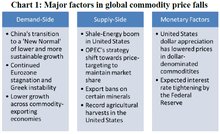Commodity price shocks
Commodity price shocks are times when the prices for commodities have increased suddenly.[1]
1971–1973
At the time of the 1973 oil crisis, the price of corn and wheat went up by a factor of three.
2005–2008
The 2007–08 world food price crisis saw corn, wheat, and rice go up by a factor of three when measured in US dollars.
Second half of 2014

Global commodity prices fell 38% between June 2014 and February 2015. Demand and supply conditions led to lower price expectations for all nine of the World Bank‟s commodity price indices - an extremely rare occurrence. The commodity price shock in the second half of 2014 cannot be attributed to any single factor or defining event.[3] It was caused by a host of industry-specific, macroeconomic and financial factors which came together to cause the simultaneous large drops across many different commodity classes. Amongst these, the transition of China's economy to more sustainable levels of growth and the shale-energy boom in the United States were the dominant demand-side and supply-side factors governing the downturn in global commodity prices.[4]
See also
External links
References
- ↑ https://scholar.google.com/scholar?hl=en&q=commodity%20price%20shocks&um=1&ie=UTF-8&sa=N&tab=ws
- ↑ Saggu, A.; Anukoonwattaka, W. (2015). "China's 'New Normal': Challenges Ahead for Asia-Pacific Trade". United Nations ESCAP. SSRN 2628613. Missing or empty
|url=(help);|access-date=requires|url=(help) - ↑ Saggu, A.; Anukoonwattaka, W. (2015). "Global Commodity Price Falls: A Transitory Boost to Economic Growth in Asia-Pacific Countries with Special Needs". United Nations ESCAP. SSRN 2617574. Missing or empty
|url=(help);|access-date=requires|url=(help) - ↑ Saggu, A.; Anukoonwattaka, W. (2015). "Commodity Price Crash: Risks to Exports and Economic Growth in Asia-Pacific LDCs and LLDCs". United Nations ESCAP. SSRN 2617542. Missing or empty
|url=(help);|access-date=requires|url=(help)